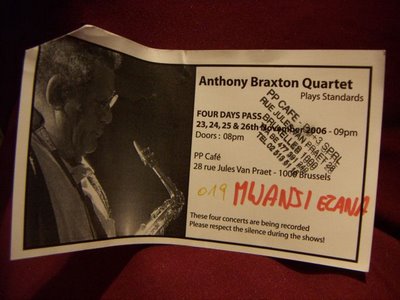Anthony Braxton Quartet@PP Café, 23/11/2006

Anthony Braxton - as, ss
Alessandro Giacero - p
Antonio Borghini - b
Cristian Calcagnile - d
Seeing Mal Waldron on three consecutive nights back in 2001 or 2002 remains one of the musical highlights of my life, so when I learned that Anthony Braxton would be at the PP Café for four nights, there was no doubt in my mind about the necessity of attending all four: opportunities to repeatedly get this close to Pantheon-level musicians are rare, precious and, as I don't know Braxton's music well at all, instructive. I would rather have heard his own compositions, but I guess bringing over the band that performed the great (well, it read as great) Iridium concerts in march of this year was beyond even the excellent concert organiser Cédric D'hondt's powers. The entire run is being recorded and filmed, so maybe you'll be able to hear/see some of it (the Iridium concerts are being released soon).
The first tune had me scared: it was very straight-ahead, head-solos-head stuff. I could only hope the whole concert wouldn't be like that. Antonio Borhini provided an early highlight during his solo, by displaying a beautiful sensitivity and lyricism, with a full sound even in the upper registers. On the Coltrane composition that started the second set, the bassist again distinguished himself with his intelligent use of plucking techniques to expressive ends. His inspiration was infectious and pushed Braxton to play a diaphanous prelude to the return to the theme. I tended to focus a lot on him: his eyes were locked on Braxton, head bobbing in tempo, fingers following the leader's every move.
The second piece of the first set reassured me. During Braxton's solo, the group exploded into free climaxes that left the standard's form behind and subsided into swing that found it again. Again, the bassist's attentiveness to the leader and responsiveness to the structural and textural changes were crucial. Here and elsewhere, when Braxton stopped and the pianist soloed, you could feel a shift from a trio + 1 to a real group. The three breathed more naturally together and sometimes added an arranging turn that betrayed their deeper relationship. This was probably inevitable, as they had started rehearsing with Braxton only monday.
Braxton picked up his soprano for the third piece, which began with atmospheric scrapes, squeaks and piano string plucks. It mutated and solidified into long held and bowed notes that sometimes seemed on the verge of cohering into a real song, but never did, remaining a surprising and wonderful ambient piece. It ended when the Cristian Calcagnile hand-drummed a thumping beat that drove a final crescendo. The territories staked out in these first three performances (straight-ahead, free/interactive, ethereal) formed the basis for the rest of the concert.
On the fifth and final song of the first set, the quartet started to come together as a whole. Braxton's solo magnificently weaved in and out of the rhythm section's straight comping and was engaged by the drummer's boisterous and fractured swing. Alessandro Giacero's solo slowed things down before launching into fascinating unaccompanied contrapuntal playing, which, with its almost-in-octaves motifs, was occasionally reminiscent of Cecil Taylor. Then he cleverly reconfigured the original melody into wide interval leaps before playing it, Mehldau-like, straight in the left hand under a right hand ostinato while the rest of the quartet, Braxton included, accompanied. This led to an out-head marked by a poignant deceleration: Braxton lovingly milked each note for its feeling.
There were three major highlights in the second set. On a Wayne Shorter tune (from Speak No Evil, but I can't remember its title), Braxton absolutely roared, thrilling the crowd. Dolphy's "Out To Lunch" showed that the rhythm section could handle complex and unusual arrangements just as well as they had glided through standards, engaged in free interaction or slipped into a Tyner mode. Finally, on a tune with a Latin/bossa beat, after the drum solo's heavy ending, Braxton shifted the musical direction with light, quiet lines that built into quiet roars over ominous tom rolls and pecking piano. The piece had been flung wide open, so the saxophonist started opening up too, which gave the others some license: Giacero continued to freely scramble up and down the keyboard during the reprise of the melody.
One thing puzzled me in Braxton's playing. At the top of every single tune, he sounded extremely... weak. That would disappear as soon as he started soloing, but it was weird. There was a total disconnect between the rhythm section's assurance and Braxton's approach. To be honest, were I to hear only the heads in a blindfold-test, I'd think something was wrong with the saxophonist. It was jarring and bizarre for three reasons, the first because, as I said, during the solos there was no fragility, the second because he would regularly play the closing head very strongly and third because he expressed vulnerability (as opposed to weakness) beautifully several times. It was very bizarre. I can't imagine that Braxton didn't do this on purpose, so if anybody has an explanation of some sort, please enlighten me.
|